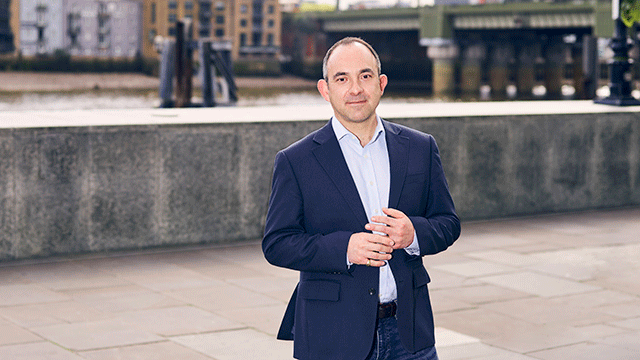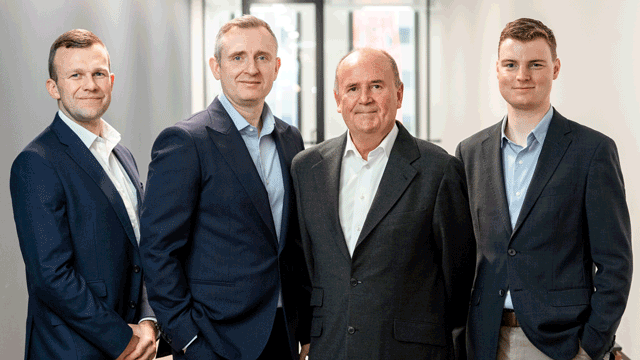Across more than two decades at consultancy Cluttons, John Gravett has risen through the ranks and played a crucial role in developing the firm’s offering around technology and connectivity. Now, stepping up to become chief executive, he has a once-in-a-career opportunity to shape the next chapter of the 260-year-old firm.
Gravett has taken the reins from James Gray, chief executive since 2016 and remaining as an adviser to the firm. The pair have been working together on the transition for about 18 months, since Gravett became managing director.
“There’s pride but [an awareness of] the enormity of the task,” Gravett said of his role in an exclusive interview with Estates Gazette. “It stops at your door to make decisions… Any CEO will have to make difficult decisions and, likewise, there will be some exciting ones to make.”
Cluttons has been in growth mode, adding some 45 members of staff last year to take the workforce across its nationwide offices to about 300. Gravett wants to boost revenue from £27m to as much as £50m but emphasised that “resilient profitability” is a greater priority than soaring revenue. And throughout, he wants team members – whether old hands such as himself or newcomers to the firm – to feel part of that expansion.
“My driver for my tenure is that I want to make it an even more exciting place for our employees,” he said. “I want to see growth nationally – we’ve seen growth in Manchester, Newcastle, an opening in Glasgow – and make [the firm] a really positive and engaging place.”
Right call
Before Cluttons, Gravett started his career at Scotland’s James Barr, working in the company’s London satellite office with mobile phone operators such as Orange and T-Mobile on the rollout of 2.5G and then 3G (“I’ve seen all the rooftops of London and the South East putting that kit out,” he said).
He moved to Cluttons in 2004 as an early member of its telecoms team, building out an estate management offering for companies including Telefonica and BT Cellnet. In 2007, the company started working with O2, covering “half the country to the whole country, to the whole management mandate”.
Since 2011, Cluttons has been managing all of Telefonica’s masts as well as its retail stores. That mandate was a landmark win for the firm, which was up against big agency names hooking their pitch on the management of 300 stores rather than the thousands of miles of masts.
“I was like, ‘we’re not going to win’, then stopped and thought, ‘Let’s give it a punt, we can do this’,” Gravett recalled. “So we did, and we ended up coming through and winning it. That started this big journey of managing all the masts and retail stores and corporate offices for Telefonica, and the rest is history.”
That win taught Gravett a lot about ambition, determination and punching above your weight.
“Yes, [we were] smaller, yes, the tick boxes may not have been on our side in terms of that standard procurement aspect, but we had the kit and, more importantly, we had the ambition and we had the hunger,” he said of the firm’s approach to winning Telefonica.
“If you get that as a group of individuals, you can overcome all sorts, be that in the sporting world or business world. It’s all about the teamwork behind that. Get the right team in place with the right focus, and you can overcome most hurdles… It does teach you: be brave and go with your conviction.”
The firm has retained that mandate through various businesses, including Telefonica’s joint venture with Vodafone to create Cornerstone. And as that part of the business has developed, it has helped to revamp clients’ real estate practices – digitising Vodafone’s leases, for example, and moved into other dynamic infrastructure areas such as energy security, working on substations and ensuring power supplies for data centres.
Blind spot
The big picture, as Gravett sees it, is “bringing connectivity into the built environment”.
“One of my big things has been the lack of education or acceptance in the property market, because people forget how important is,” he said. “If you haven’t got mobile connectivity, how in the hell are you going to use a laptop in the building? The property industry still hasn’t, in my opinion, really grasped the nettle of understanding how important connectivity is.”
What has got in the way? It’s a “proper blind spot”, Gravett said. “It’s education. C-suite get it but I don’t think the surveyors down the chain are fully prioritised on it. And then it’s the [question of] who pays for it – is it the landlord or tenant that pays for it? It’s that whole tripartite-type world of infrastructure provider, landlord and tenant. At the end of the day, a well-connected building for a landlord should mean you have stronger lettings, minimal vacancy rates and a happy tenant. A happy tenant pays more and your building’s good. It’s one of these necessities now.”
Some real estate companies have got to grips with the importance of the topic admirably, Gravett said, highlighting British Land and The Crown Estate as notable examples. “But it still isn’t the norm. People talk about it at the high level but at the operational level it’s a different situation,” he said.
Getting this right affects more than just tenancy, he added – connectivity and digitisation are crucial steps to keeping track of the data that will allow real estate companies to meet sustainability goals. “This is quite a fundamental pillar of the overall strategy for the built environment to head towards its net zero commitments, and there is that disconnect there.”
Listen and learn
Throughout a conversation about Cluttons and his new role leading it, Gravett often comes back to the idea of heritage, and respecting it while also being unafraid to change.
“Think about our role in this connectivity, energy and power sector,” he said. “Think of what London must have been like in 1765 [when the firm was established] and then think of 2025 and our vision for 2030, 2040. I love that romantic element of Cluttons and the past and the future. That sort of heritage.”
In January, the company won back the mandate for Wellcome Trust’s South Kensington estate, which it had held since its establishment but had lost in 2011. Winning back such a prestigious mandate is another mark of not losing sight of the firm’s past – and also underscores some of the attributes clients most appreciate about Cluttons, Gravett said.
“Why has it come back? In my view because we listened,” he said. “We’ve got a good strong team and we try and do things bespoke, which the bigger organisations don’t.
“Some clients want to say, ‘I’ve got this problem’ or ‘I want this type of service’, and if you’re at our size, we mould into that and we flex into it. That’s where our unique skill set as a business is going forward. I’m personally really happy being an SME of our size. I don’t want to be in a Goliath organisation. Having that flexibility to adapt to listen to clients – knowing we won’t get everything but knowing what we can get – is really important to me.”
In controlling what he can but knowing what he cannot, Gravett is gearing up for the challenge of steering Cluttons during his time in the top seat. The past five years have thrown up issues such as Covid, Liz Truss’s disastrous mini-Budget, the war in Ukraine and more. Expect the unexpected has become a mantra for Gravett.
“The last five years-plus has woken us all up to the need to be really careful about our housekeeping and how we look after our businesses to make sure they are set for the future,” he said. “Part of my role now is to make sure the business is in a better position once I finish my tenure.”
Image © Tom Campbell
Send feedback to Tim Burke
Follow Estates Gazette











